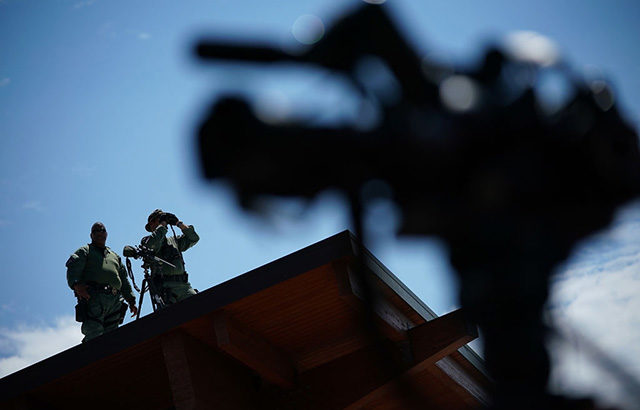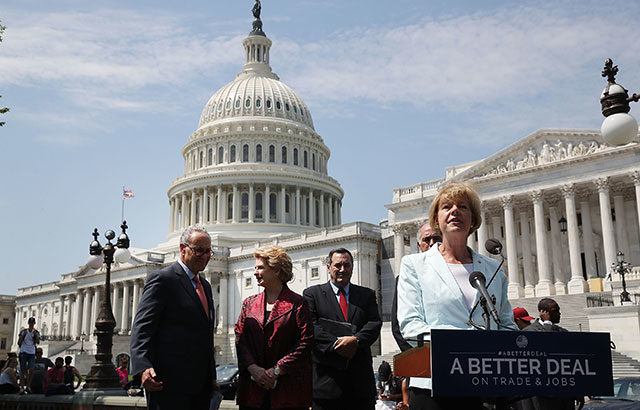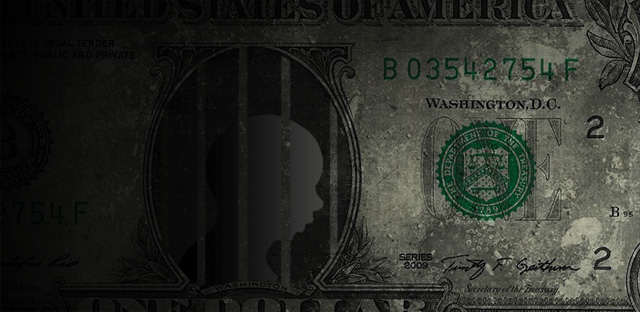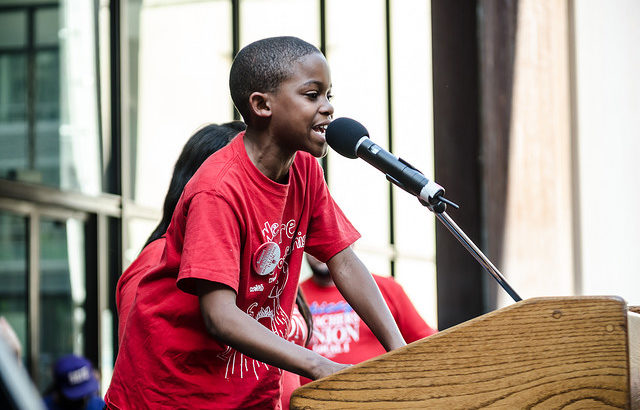By Henry A. Giroux
The recent «Unite the Right» march by a couple of hundred white supremacists, neo-Nazis and other right-wing extremists across the University of Virginia campus offered a glimpse of the growing danger of authoritarian movements both in the United States and across the globe, reeking of the 1930s. The image of hundreds of fascist bullies chanting anti-Semitic, racist and white nationalist slogans, such as «Heil Trump,» and later attacking peaceful anti-racist counter-demonstrators makes clear that the radical right-wing groups that have been on the margins of American society are now more comfortable in public with their nihilistic and dangerous politics.
They appear especially emboldened to come out of the shadows because elements of their neo-fascist ideology have found a comfortable if not supportive place at the highest levels of the Trump administration, especially in the presence of Steve Bannon, Jeff Sessions and Stephen Miller, who espouse elements of the nefarious racist ideology that was on full display in Charlottesville. As is well known, Trump has embraced the presence and backing of white nationalists and white supremacists while refusing to denounce their Nazi slogans and violence in strong political and ethical terms, suggesting his own complicity with such movements.
It should surprise no one that David Duke, a former imperial wizard of the Ku Klux Klan, told reporters on Saturday that the Unite the Right followers were «going to fulfill the promises of Donald Trump … to take our country back.» Nor should it surprise anyone that Trump initially refused to condemn the fascist groups behind the horrifying, shocking images and violence that took place in Charlottesville.
Trump’s silence made elements of the far right quite happy. For instance, the Daily Stormer, a white supremacist website, issued the following statement: «Refused to answer a question about White Nationalists supporting him. No condemnation at all. When asked to condemn, he just walked out of the room. Really, really good. God bless him.»
It appears that the presence of Nazi and Confederate flags, along with the horrible history of millions lost to the Holocaust and slavery, lynchings, church bombings, and the assassination of Black leaders, such as Medgar Evans and Martin Luther King Jr., did little to move Trump to a serious understanding or repudiation of the poisonous historical forces that surfaced in Charlottesville. As New Yorker writer Jelani Cobb observes, this was a telling moment. He writes:
When [Trump] did speak about the crisis, he denounced bigotry and violence «on many sides,» in a statement that was bizarrely punctuated by references to efforts to reform trade relationships and better conditions for veterans. We have seen a great number of false equivalencies in the past two years, and the most recent Presidential election was defined by them. Yet it remains striking to hear Trump imply that Nazis and the interracial group of demonstrators who gathered to oppose them were, in essence, equally wrong.
While Trump finally gave way to overwhelming pressure on Monday and delivered a speech in which he asserted that «racism is evil» and described the KKK, neo-Nazis and white supremacists as «repugnant,» by Tuesday he had already reverted to his initial assertion of «blame on both sides,» equating neo-Nazis with anti-racist counter-protesters (whom he labelled as the «alt-left») and speaking of «very fine people» among the crowd of right-wing extremists who chanted racist and anti-Semitic slogans on Friday night.
The authoritarian drama unfolding across the United States has many registers and includes state violence against immigrants, right-wing populist violence against mosques and synagogues, and attacks on Muslims, Black people and others who do not fit into the vile script of white nationalism. The violence in Charlottesville is but one register of a larger mirror of domestic terrorism and home-grown fascism that is growing in the United States.
Such demonstrations represent a historical moment that capture some of the elements of a past that led to some of the worse crimes in human history. At the risk of falling prey to historical amnesia, the crucial lesson to be learned is that the ideology, values and institutions of a liberal democracy are once again under assault by those who no longer believe in equality, justice and democracy. As the historian Timothy Snyder has observed, it is crucial to remember that the success of authoritarian regimes in Germany and other places succeeded, in part, because they were not stopped in the early stages of their development.
The growing call for illiberal democracies (code for authoritarian regimes) first begins with the popularization and normalization of hate and bigotry, which we have witnessed under the Trump regime, and then morphs into right-wing groups developing their own militias, organs of violence and paramilitary forces.
Charlottesville provides a glimpse of authoritarianism on the rise and speaks to the dark clouds that appear to be ushering in a new and dangerous historical moment. While it is problematic to assume that a US-style totalitarianism will soon become the norm in the United States, it is not unrealistic to recognize that the possibility for a return to authoritarianism is no longer the stuff of fantasy or paranoia, especially since its core elements of hatred, exclusion, racism and white supremacy have been incorporated into both the highest levels of state power and the mainstream right-wing media. The horrors of the past are real, and the fears they produce about the present are the necessary work of both historical memory and the power of civic courage and moral responsibility.
Liberal Democracy Is Losing Its Grip
In Selections from the Prison Notebooks, Antonio Gramsci, the great Italian Marxist philosopher, observed that one measure of a time of crisis is «that the great masses … become detached from their traditional ideologies and no longer believe what they used to believe previously. The crisis consists precisely in the fact that the old is dying and the new cannot be born; in this interregnum, a great variety of morbid symptoms appear.»
While Gramsci was characterizing a different historical period, his words are as relevant today as they were when written in the 1930s. All over the globe, liberal democracy is losing its grip on the public imagination and in the midst of this loss a toxic form of illiberal democracy is taking its place. As institutions that once provided public visions and proactive spaces are stripped of their authority and decay under the scourge of casino capitalism, the foundation is being set for the rise of new modes of authoritarianism. What they all share is both a hatred for democracy and a willingness to feed off the anger and rage of those who have suffered under punishing austerity measures imposed by global capitalism. At a time in which the growing problems of inequality, terrorism, war, state violence, immigration, precarity, mass poverty and the elimination of the welfare state have accelerated, stable democracies have been shattered.
In the midst of a massive global attack on the welfare state and social provisions fueled by neoliberal policies, the social contract central to liberal democracies has been shredded and with it any viable notion of solidarity, economic justice and the common good. Progress has been turned into its opposite and registers more inequality, suffering and violence. The older language of collective rights has given way to the discourse of individual rights, and the vocabulary of collaboration and compassion has been uprooted by a discourse of radical individualism and a harsh, survival-of-the fittest ethos. «Freedom» has morphed into a synonym for unbridled self-interest and a rationale for abdicating any sense of moral and political responsibility. Under global neoliberalism, the future is viewed as more of a curse than a blessing and has lost its value as what Zygmunt Bauman calls «the safest and most promising location for investing [one’s] hopes.» In contrast, as Bauman observes in his contribution to The Great Regression, the future has now become a repository for projecting our most dreaded anxieties. He writes that such fears and apprehensions are now driven by a number of elements that have come to characterize neoliberal societies:
the growing scarcity of jobs, of falling incomes reducing our and our children’s life chances, of the yet greater frailty of our social positions and the temporality of our life achievements, of the increasingly widening gap between the tools, resources and skills at our disposal and the momentousness of the challenges facing us. Above all, we feel our control over our own lives slipping from our hands, reducing us to the status of pawns moved to and fro in a chess game played by unknown players indifferent to our needs, if not downright hostile and cruel, and all too ready to sacrifice us in pursuit of their own objectives. Not so long ago associated with more comfort and less inconvenience, what the thought of the future tends nowadays to bring to mind most often is the gruesome menace of being identified or classified as inept and unfit for the task, denied value and dignity, and for that reason marginalized, excluded and outcast.
The dream of the democracy has turned into a nightmare as more and more people are considered expendable and subject to the whims of a market that reduces them to the status of merely surviving rather than getting ahead. The failure of neoliberalism’s promise of social mobility, equal opportunity, employment and privatized dream worlds gave way to regressive taxation, off shoring, deindustrialization, the slashing of social provisions, the dismantling of public services and the rise of right-wing populism. Desperation, isolation and a sense of abandonment coupled with the collapse of democratic institutions and public spheres have produced a new collective fatalism all over the globe.
Growing Support for Authoritarianism
The increasing failure of global neoliberalism has produced the conditions in which more and more people are inclined to express support for authoritarian alternatives that reproduce the power of right-wing populist nationalists and favor the interest of white majorities who advocate a return of barricades and borders rather than eliminating the systemic conditions of economic, cultural and social domination. Viktor Orbán, the Hungarian prime minister, spoke for many when he proclaimed that societies founded on liberal principles will not be able to compete successfully in a global market and that there is no reason for democracies to be liberal in order to be successful. According to Orbán, the state is not defined by democratic values, but by its economic and cultural interests, interests that fall on the side of a growing number of far-right regimes. He writes:
The new state that we are building is an illiberal state, a non-liberal state. It does not deny foundational values of liberalism, as freedom, etc. But it does not make this ideology a central element of state organization, but applies a specific, national, particular approach in its stead…. We are searching for (and we are doing our best to find, ways of parting with Western European dogmas, making ourselves independent from them) the form of organizing a community, that is capable of making us competitive in this great world-race.
This worldwide rejection of liberal democracy is fuelled by a landscape of massive instability, inequality, fear and insecurity driven by a counterrevolutionary global capitalism of permanent change that, in the words of Pankaj Mishra, can neither «fulfil its own promise of general prosperity [or conceal] its contempt for the democratic principle of equality.» In the place of failed states and broken economies, there has been a retreat into promises offered by the rise of the security state, racial cleansing, economic nationalism, xenophobia and a call for the suppression of dissent and a growing emphasis on law and order. Heinrich Geiselberger has called this «the great regression,» an apt metaphor for the growing collapse of public discourse, values and democratic institutions and public spheres. As is well documented, the toxic effects of neoliberalism cannot be separated from diverse counterrevolutionary and right-wing populist forces that have contributed to the resurgence of authoritarianism across the globe.
The political crises and earthquakes shaking the foundations of liberal democracy reveal more than the pent-up collective energies of despair, rage and insecurity. They also speak to the growing mechanisms of exclusion and ideologies of racist contempt that have returned with a vengeance all over Europe and in the United States. Dressed up in the discourse of a ruthless hyper-capitalism, the crises haunting liberal democracies across the globe have provided fodder for right-wing demagogues to promote nationalistic policies. In so doing, they denounce democratic values in the name of a popular will that both resents what the political establishment has done to them and is comfortable with political leaders who are xenophobic, authoritarian and patriarchal. Accompanying the rise of authoritarian states in Russia, India, Turkey, Hungary, Egypt, the Philippines and the United States, among others, there is also the growing presence of right-wing political formations in France, Greece, Italy and a number of other countries.
Rising Bigotry and Nationalism
Politics has become more personal, wrapping itself in the narrow embrace of cultural nationalism and racial, religious and ethnic bigotry. Historic calls for democratization that marked the post-war period have given rise, in part, to a collective anxiety and apprehension fuelled by a despair and anger deeply tied to a form of casino capitalism that camouflaged its underlying modes of oppression and politics of disposability in the seductive yet failed discourses of freedom and justice, both of which were defined in strictly economic and market terms. Stoked by fear and a resentment toward those considered a threat to white nationalist ideologies, the retreat from the imposed death-dealing effects of neoliberalism parading as democracy gave rise to the awkward return of the repressive ideologies of ethno-nationalism, the stifling of dissent and exaltation of state violence as a mode of governance.
For instance, under Recep Tayyip Erdoğan in Turkey there has been a return to the traditions and grandeur of an Ottoman past. In India, the right-wing ideologue, Narendra Modi, has resurrected the ideology of Hindu nationalism. In a similar vein, President Trump has fuelled a culture of fear, racism and demonization as part of his efforts to resuscitate a culture of white Christian nationalism has reproduced in the first part of his presidency his own brand of political illiberalism. As Paul Mason points out:
If we analyse Trump through his actions, rather than his garbled words, it is political illiberalism that has won out during the first seven months of his presidency. When a judge blocked his Muslim immigration ban, he attacked the judiciary’s constitutional role. When the press revealed malfeasance, he labelled them «enemies of the American people». When James Comey refused Trump’s appeals for «loyalty,» he was sacked.
White resentment and white nationalism have come to symbolize Trump’s politics, beginning with his egregious and false claim that Barack Obama was not born in the United States, and taking shape in his appointment of white nationalists, such as Jeff Sessions and Steve Bannon, to the highest levels of government — an issue I have discussed in detail in my forthcoming book American Nightmare: The Challenge of American Authoritarianism (City Lights Press, 2018). Such measures have bolstered his credibility with white militias, neo-Nazis and other white nationalist groups. Carol Anderson correctly states that «The guiding principle in Mr. Trump’s government is to turn the politics of white resentment into the policies of white rage — that calculated mechanism of executive orders, laws and agency directives that undermines and punishes minority achievement and aspiration.»
Arjun Appadurai argues that what Trump and similar authoritarian leaders have in common is a hatred of democracy because it stands in the way of their monomaniacal efforts to seize political power. In his contribution to The Great Regression anthology, he writes:
The leaders hate democracy because it is an obstacle to their monomaniacal pursuit of power. The followers are victims of democracy fatigue who see electoral politics as the best way to exit democracy itself. This hatred and this exhaustion find their natural common ground in the space of cultural sovereignty, enacted in scripts of racial victory for resentful majorities, national ethnic purity and global resurgence through the promises of soft power. This common cultural ground inevitably hides the deep contradictions between the neoliberal economic policies and well-documented crony capitalism of most of these authoritarian leaders and the genuine economic suffering and anxiety of the bulk of their mass followings. It is also the terrain of a new politics of exclusion, whose targets are either migrants or internal ethnic minorities or both.
It is against this wider historical and social context marked by a mounting embrace of illiberal democracy that the authoritarian populism of Donald Trump and other demagogues can be both interrogated and challenged, especially when the political interests that bear part responsibility for producing what Mike Lofgren has described as a «neoliberal economics turned punitive and illiberal» now claim to be the only force capable of resisting Trump’s authoritarianism. It is also against this worldwide embrace of illiberal democracy that a debate must begin over rethinking politics outside of the discourse of capitalism.
Failures of the Politics of Resentment
Trump’s appearance on the political landscape is part of a much broader politics of resentment, one that denies the theoretical and political tools to assess the conditions for free-floating anger and despair in the first place. Put differently, the political crisis signalled by the US morphing into a form of authoritarianism has not been matched by a crisis of ideas. That is, the issue of how everyday problems and hardships are connected to wider economic and political structures is left unanswered for most Americans. Instead, the politics of resentment has become part of a threefold failed project of politics. First, the politics of resentment has been appropriated by Republican extremists to serve as part of a politics of authoritarianism. Second, resentment politics has produced highly restricted forms of resistance on the part of many liberals whose focus is on Trump the man rather than on the economic conditions and ideological movements that produced him. Third, the expressions of resentment and the authoritarian politics they produced have become a new form of entertainment through which the corporate-controlled media generates an endless stream of what might be called tabloid politics in which the political realm dissolves into a lurid pornography of aesthetics. As one expression of such a politics, news cycles fill up their time slots and papers by devoting endless amounts of commentary to Trump’s tweets, all the while legitimating the notion that the pathology of authoritarian governance is primarily about the spectacle of performance. What the corporate media miss is that Trump’s tweets are meant to produce a politics of fatigue and theatrics that serve as code for his right-wing followers in an expanding counterrevolution that embraces the values of a Second Gilded Age.
The growing tide of demagoguery in the United States and across the globe must begin with the changing nature of neoliberal ideology and its transformation from a free-market utopia to a normalized dystopian reality. At stake here is the need for a post-neoliberal narrative in which democratic ideals can no longer be defended under conditions of neoliberal globalization. The rise of illiberal democracy is based on the premise that democracy should not be defended because it cannot be realized under neoliberal regimes. The bold new authoritarian strategy emerging out of this cold recognition is not to dispense with neoliberalism but with democracy itself.
No longer able to hide the massive misery, inequality and hardship that the «free market» has produced across the globe, the new authoritarians no longer praise the laws of an unfettered market fundamentalism. Instead, they rely on a politics of distraction, such as an appeal to cultural nationalism and the longing for the re-establishment of a mythic past. Trump has appropriated this politics of distraction, giving it a unique configuration, one that reinforces the domination of neoliberal elites while making invisible the underlying structures of predatory economic and political power that have consolidated further still under his administration. Of course, this is not meant to confuse elements of his popular racist, fascistic and white nationalist base. Rather, it is meant to distract those politicians, pundits and anti-public intellectuals who have no interest in fighting for progressive change and who prefer the theater associated with Trump’s tweets rather than engaging in a serious debate about the bankruptcy of the neoliberal system. This diversion has been successful in delaying the debate about how the crisis of democracy is largely connected to the crisis of neoliberal capitalism, militarism and the emergence of an authoritarianism in support of an illiberal democracy.
While demagogues across Europe and other parts of the globe maintain control through the outright suppression of dissent and the dismantling of civil liberties [Turkey, China, Russia and Egypt], Trump has taken a different route. Trump’s policies benefit not only the financial master class but also the established neoliberal politicians and intellectuals who still champion globalization, assuming the role of his most serious opposition while posturing as the vanguard of resistance against his accelerating authoritarianism. Trump inverts the rules of ideology by denying its very premises, thus introducing a form of depoliticization and manufactured ignorance that eliminates the affective and educational foundations for a liberal democracy.
Trump’s endless lies, impetuous outbursts and regressive policies — such as stepping up deportations of undocumented immigrants, rolling back affirmative action and banning transgender troops from serving in the military — are largely engineered to satisfy his shrinking base of support. But there is more at work here than simply creating subterfuge for political ends or for justifying such deceitfulness as part of a militaristic and reactionary strategy of making politics an extension of the art of war. The latter has become an industry and it has a long history in US politics. Trump’s mendacity should be viewed as part of a staged politics of distraction that provides cover for the brutal neoliberal policies that he both ruthlessly supports and egregiously symbolizes. After all, it was largely the debris of neoliberal policies that brought Trump to power, a wreckage he relentlessly exploited.
Certainly, it is obvious that Trump is a racist, xenophobe and egregious sexist. But most of all, he is emblematic of a ruthless corporate, self-serving, greedy elite who will do anything to consolidate their class and financial power. His theatrical antics and spectacularized politics represent crude entertainment for his base and rising profit margins for the mainstream media; they also signal the need to divert attention away from the ideological, economic, political and structural forces that have laid the groundwork for the appeal of illiberal democracy and the rising tide of authoritarianism in the United States. The latter is especially true for those Trump supporters who are more independent politically, who are not driven by white supremacist imperatives and who are sympathetic to the call of anti-establishment politicians.
What Trump, or at least Steve Bannon, is well aware of is that the struggle over power is not only about the struggle over language and beliefs, but also about the destruction of those intellectual and institutional elements that enable the capacity for informed judgment and the ability to hold onto any belief with a sense of commitment and integrity. Hence, his ongoing attempts to destroy critical media, public education and those democratic public spheres that provide the protective spaces of education in the broadest sense of the term. What is disturbing about this endorsement of mass illiteracy and political ignorance is that it is not just about accusing the critical media of producing fake news, it is also about creating support among his 35 million followers for supporting unconstitutional legislation designed to silence the so-called liberal press for inaccurate reporting. For instance, The Economist reported that «When YouGov asked whether courts should be allowed to ‘shut down news media outlets for publishing or broadcasting stories that are biased and inaccurate’, 45% of Republicans were in favour, compared with 20% who opposed the measure. More than half thought it acceptable to fine an offending news outlet (and 40% thought it would not violate the First Amendment to do so).»
Trump’s authoritarianism is as much about the crisis of democracy as it is about the crisis of casino capitalism, clearly exemplified by the emergence of right- and left-wing populist movements that are angry and bitter over what the conservative and liberal elites and their political and economic systems have done to them. No longer able to employ the mythical elements of neoliberalism in light of the growing attack of progressive activists on the financial ruling classes and a mounting criticism of what many believe is a failed state — an attack that cuts across ideological boundaries — the Republican disciples of neoliberalism have dispensed with ideology and now rely on a raw politics bent on voter suppression, gerrymandering, mass incarceration, defunding of public goods and other tactics to eliminate any vestige of a liberal democracy.
Trump’s diversions make it difficult for the public to uphold or even define the standards that sustain the rule of law, democratic governance and the value of educational institutions committed to individual freedom, civil liberties, justice and human rights. Trump’s lies do more than distract and pollute the space of a shared potential reality — they empty language of any substantive meaning and in doing so serve to erase the power and value of historical consciousness and the critical formative cultures that produce both informed agents and individual and collective acts of resistance. Trump’s presidency stands for the abandonment of ideology or what I will call a pedagogical politics of persuasion in which ideas become weapons and educational tools to shape consciousness, desires and identities. This is not to deny that Trump is afraid of ideas or the willingness to embrace them when it serves his political ends as much as to suggest that his deepest concern is with preventing people from developing the capacity to think critically in the first place and to act on informed critiques of power. This in part explains his obsession with a notion of loyalty that has little to do with a commitment to justice or the common good as much as it is a cover for unquestioned obedience to him.
Rites of «Purification» in the Wake of Neoliberal Corporate Sovereignty
What we are witnessing in the rise of illiberal democracies across the globe is a rite of political, racial and social purification that appeals to an imagined lost dominance on the part of individual nation states in the wake of neoliberalism’s corporate sovereignty. What is left out of this narrative by Trump and other authoritarian leaders is that modern states no longer control their economies, which are now in the hands of a global financial elite and authoritarian populists. Power is now financial, mobile and global, managed by a free-floating elite at liberty to pursue its own interests and targets. Fiscal and monetary policies are no longer in the hands of the nation states, residing in the hands of international financial institutions, such as the European Central Bank and International Monetary Fund, which exist beyond national accountability. As Zygmunt Bauman and Leonidas Donskis have argued in their book Moral Blindness, the nation state remains the repository of a politics «squeezed and robbed of all or nearly all of its power, muscles and teeth,» reduced to serving the dictates of global capital and expanding its role as a punishing state. As the protective functions of the state are targeted, the foundations of existential security and solidarity are eroded, giving rise to a Hobbesian world where no room exists for care and compassion, only callousness and indifference, cruelty and suffering.
Arjun Appadurai, in his discussion of «democracy fatigue,» captures the hollowing out of the nation state, describing the return to cultural purification and ethno-nationalism as a means to stifle dissent and to avoid addressing the underlying causes responsible for economic sovereignty being replaced by ethno-nationalism and cultural sovereignty. He writes:
This, then, is what the leaders of the new authoritarian populisms have in common: the recognition that none of them can truly control their national economies, which are hostages to foreign investors, global agreements, transnational finance, mobile labour and capital in general. All of them promise national cultural purification as a route to global political power. All of them are friendly to neoliberal capitalism, with their own versions of how to make it work for India, Turkey, the United States or Russia. All of them seek to translate soft power into hard power. And none of them has any reservations about repressing minorities and dissidents, stifling free speech or using the law to throttle their opponents…. Thus populist authoritarian leaders and demagogues are to be found everywhere across the old continent, and they too operate with the same mix of neoliberalism, cultural chauvinism, anti-immigrant anger and majoritarian rage.
In Trump’s world, there is no need to rely heavily on ideology because there are no standards, no firm ground on which matters of persuasion and belief root themselves. Instead, ideas, reason, evidence and truth collapse in a sea of misrepresentations, engineered stupidity and diversions, all of which are designed, as Hannah Arendt once argued, to prepare the ground for a form of totalitarianism rooted in contempt for critical thought, if not the very act of thinking. The foundation for authoritarianism, she wrote, lies in a kind of mass thoughtlessness in which a citizenry «is deprived not only of its capacity to act but also its capacity to think and to judge.» Manufactured ignorance and the slide into authoritarianism has become a staple of American life, but it cannot be reduced to the scourge of economic structures.
Cultural politics and the educational force of the corporate-controlled cultural apparatuses such as the mainstream media are a potent force for ignorance and depoliticization in the United States. The blight of celebrity culture, an engineered culture of fear that activates a hatred of others, the destruction of public education and the corporatization of higher education, the rise of the surveillance state and the war on terrorism all contribute to a collective paranoia that produces social isolation, a heightened sense of rootlessness, the privatization of everything and the conflation of citizenship with a dreary ethos of consumerism.
Under neoliberalism, too many people are trapped in their own private orbits, unable to address the systemic conditions that destroy the ties that connect them to others while reproducing the conditions in which the body is uprooted from any sense of community and the existential need for belonging. As George Orwell, Hannah Arendt, Zygmunt Bauman and other prominent intellectuals have predicted, such isolation kills the imagination and finds symbolic compensation in the ideological appeals of authoritarian leaders who promise communities organized around hate, violence and exclusion. All of this amounts to a swindle of fulfillment and a rejection of liberal democracy.
Trump has dispensed with the fiction of democracy because he believes that in the interest of power both people and the planet are disposable, excess to be plundered and discarded. As part of an effort to normalize this pathology, he systematically employs a politics of diversion to prevent the public from addressing the underlying neoliberal forces and conditions that sold democracy to the bankers, hedge fund managers and other surrogates of finance. Under Trump, democracy is not being thinned out, it is being replaced by a regime that is hostile to its existence while fighting to maintain the economic conditions that have allowed the United States to slide into authoritarianism.
Source:
http://www.truth-out.org/news/item/41617-neo-nazis-in-charlottesville-and-the-rise-of-illiberal-democracy













 Users Today : 20
Users Today : 20 Total Users : 35460844
Total Users : 35460844 Views Today : 29
Views Today : 29 Total views : 3420106
Total views : 3420106